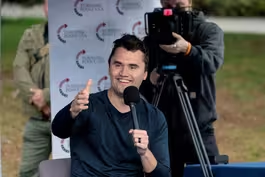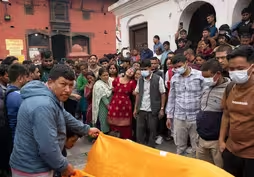
Comedians use laughter as a new tool for suicide prevention
Clip: 9/14/2025 | 5m 4sVideo has Closed Captions
Comedians use laughter as a new tool for suicide prevention
Suicide is one of the leading causes of death in the United States, claiming more than 49,000 lives in 2023 alone, according to the latest CDC data. One organization has found an unconventional tool to combat those grim numbers: laughter. Lisa Desjardins speaks with Brad Bonar Jr., founder of the 1 Degree of Separation suicide prevention program, for our arts and culture series, CANVAS.
Problems playing video? | Closed Captioning Feedback
Problems playing video? | Closed Captioning Feedback
Major corporate funding for the PBS News Hour is provided by BDO, BNSF, Consumer Cellular, American Cruise Lines, and Raymond James. Funding for the PBS NewsHour Weekend is provided by...

Comedians use laughter as a new tool for suicide prevention
Clip: 9/14/2025 | 5m 4sVideo has Closed Captions
Suicide is one of the leading causes of death in the United States, claiming more than 49,000 lives in 2023 alone, according to the latest CDC data. One organization has found an unconventional tool to combat those grim numbers: laughter. Lisa Desjardins speaks with Brad Bonar Jr., founder of the 1 Degree of Separation suicide prevention program, for our arts and culture series, CANVAS.
Problems playing video? | Closed Captioning Feedback
How to Watch PBS News Hour
PBS News Hour is available to stream on pbs.org and the free PBS App, available on iPhone, Apple TV, Android TV, Android smartphones, Amazon Fire TV, Amazon Fire Tablet, Roku, Samsung Smart TV, and Vizio.
Providing Support for PBS.org
Learn Moreabout PBS online sponsorshipLisa: All warning, this next story discusses suicide but it centers on an original idea for preventing it.
In the U.S.
Suicide is one of the leading causes of death claiming more than 49,000 lives in 2023 alone, according to the latest CDC data.
But one organization has found an unconventional tool to combat those grim numbers -- laughter.
The group is called 1 degree of separation, made up of comedians who hold sessions that start not with advice but family-friendly jokes like these.
>> I really enjoyed growing up here except for the part where I actually had to live here.
>> I went on a date with this girl She was like, you're so tall and handsome.
How are you single?
I was like, you'll see.
Lisa: Brad Bonar Jr. Is the founder of the suicide prevention by comedy program - 1 degree of separation.
He joins us as part of our look at the intersection of health and art, part of our arts and culture series, canvas.
Thank you for talking to us about this.
Traditional approaches to this area are very serious, straightforward, why did you think comedy should get involved?
Brad: A big influence was the biography about robin Williams after he died by suicide.
I kept waiting for them to talk about his depression or suicide and then the documentary was over.
They don't even mention a word about it.
It upset me.
He would have talked about this.
I don't think he would've shied away from this as a topic.
I wonder if I could get a group of comics together that would just give a raw, real, demonstration and conversation about what depression looks and feels like.
Lisa: You are an advocate, coach and someone who has experienced this yourself.
But I wonder, when you get in a room with comedians, when they're talking to folks who maybe haven't opened up even to themselves about this, what do you see?
- - What does this do when it is happening?
Brad: There are so many steps to dealing with oppression.
The first is to talk about it.
If you don't get that one, none of the other things happen.
We hear about people going into a mental hospital or volunteering themselves after they come to one of our events because it encourages dialog and makes it feel comfortable.
One of our comics, Kevin Davis, he's a 20 year Marine Corps veteran, master sergeant.
Until he met us he had never , talked about his depression.
He's 66 now and he says, this is the happiest I've ever been in my life because I don't have the secrets I have spilled them all on stage.
Lisa: You have about 100 comedians so far that have participated.
You'd like them to be from local areas, but you specifically make sure to go out to rural areas and also military bases.
I'm curious.
Those are two areas that we see really heavy incidents, of depression and suicide.
What have you learned by going into those areas about the problem and resolving it?
Brad: One big thing I learned is that depression is the same for everybody.
Every culture thinks we don't talk about it, but no culture talks about it.
We always have a very diverse panel of comedians, but I tell people, I go, the diversity is just for the flyer, so it looks good.
Because as soon as we start talking about depression, it does not matter.
Kevin Davis, the first show he did for us afterwards, he's African-American, he said, I didn't realize white people had the same depression.
What I learned is even in these rural communities is that we're all first responders for a mental health emergency.
The first person for a mental health emergency is not gonna be an emt, a therapist, a doctor.
It will be your friend, the person next to you.
Lisa: I know you start with the comedy, and then, you show these five questions that center around the idea of what is helpful to you and what is harmful to you, either in your own actions or other people's actions.
Why those questions?
What do those do?
Brad: I wrote these down into minutes.
Word for word, we've given out over 80,000 of these five question cards.
We have clinics now that their intake questions for all new mental health patients are our five questions.
They are all-encompassing, a big umbrella, nonconfrontational and everyone's afraid to have the conversation.
Well, here's five questions.
Ask these questions, listen and you'll have an amazing insight into what somebody's depression feels like, the physical part of it, what others do that makes it worse, what others that makes better.
Then that fourth question, that self inventory of what do you do that makes it worse.
You could say I isolate, I lie, say I'm fine when I'm not, I drink too much.
You know all of these things that have a factor in it and then that last question is the positive one.
What do you do that makes it better?
The questions are there to have a conversation, nothing confrontational.
They're really just open-ended, simple, simple questions.
Brad Bonar, your laughter is the best medicine, but laughter along with listening.
Thank you for helping us listen.
Brad: Thank you.
♪
New London archive celebrates David Bowie’s dazzling legacy
Video has Closed Captions
Clip: 9/14/2025 | 2m 49s | New archive in London celebrates David Bowie’s dazzling career and legacy (2m 49s)
News Wrap: More details about suspected Kirk shooter emerge
Video has Closed Captions
Clip: 9/14/2025 | 2m 46s | News Wrap: Utah Gov. Cox shares more details about suspected Kirk shooter (2m 46s)
What drove Gen Z protests that toppled Nepal’s government
Video has Closed Captions
Clip: 9/14/2025 | 5m 38s | The key issues that drove Gen Z protests that toppled Nepal’s government (5m 38s)
Providing Support for PBS.org
Learn Moreabout PBS online sponsorship
- News and Public Affairs

FRONTLINE is investigative journalism that questions, explains and changes our world.

- News and Public Affairs

Amanpour and Company features conversations with leaders and decision makers.












Support for PBS provided by:
Major corporate funding for the PBS News Hour is provided by BDO, BNSF, Consumer Cellular, American Cruise Lines, and Raymond James. Funding for the PBS NewsHour Weekend is provided by...


